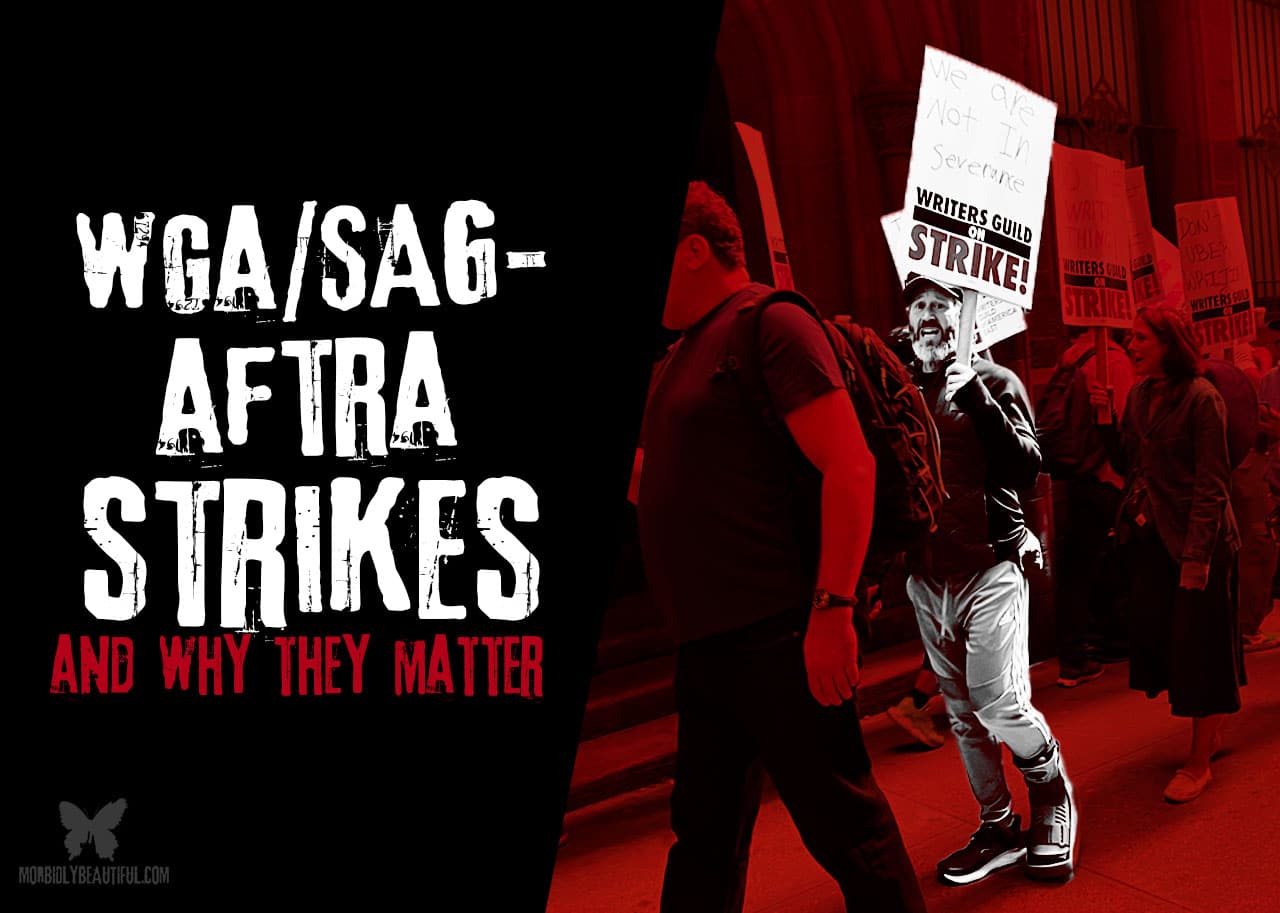WGA And SAG-AFTRA Strike: What It Means For Hollywood

Table of Contents
Key Demands of the WGA and SAG-AFTRA Strikes
The WGA and SAG-AFTRA strikes are fueled by a range of crucial demands, reflecting the evolving landscape of the entertainment industry and the challenges faced by writers and actors in the streaming era.
Fair Wages and Residuals in the Streaming Era
The traditional compensation model for writers and actors has been severely disrupted by the rise of streaming platforms. Unlike network television and theatrical releases, streaming services often offer significantly lower residuals, impacting the long-term financial security of those who create and perform in the content. This disparity is a central point of contention in the current Hollywood strike.
- Increased minimum pay: The unions are demanding significant increases to minimum pay rates to reflect the rising cost of living and the increased demands placed upon their members.
- Fair streaming residuals: The core demand revolves around a fair and transparent system for calculating and distributing residuals from streaming platforms, ensuring writers and actors receive a share commensurate with the immense viewership these platforms generate.
- Improved transparency in compensation: The unions seek greater transparency in how studios calculate and distribute payments, combating opaque practices that often leave actors and writers undercompensated.
- AI's impact on compensation: The increasing use of AI in the industry threatens to further reduce opportunities and diminish compensation for human creatives. The unions are demanding safeguards against exploitation.
Protecting Writers and Actors from AI
The rapid advancement of artificial intelligence presents significant challenges to writers and actors. Concerns center on the potential for AI to replace human creativity and labor, leading to job displacement and the exploitation of existing work. Both unions are actively demanding protections against such exploitation.
- Limitations on AI-generated scripts: The unions are pushing for regulations on the use of AI-generated scripts, ensuring that human writers retain control over the creative process.
- Protecting actors' likenesses: SAG-AFTRA is seeking to safeguard actors’ rights and prevent the unauthorized use of their likeness, voice, or performance data by AI systems.
- Fair compensation for AI-assisted work: If AI is used, the unions demand fair compensation for the creative input and supervision provided by human professionals.
- Preventing the devaluation of creative labor: The core concern is the potential for AI to devalue the work of writers and actors, leading to lower wages and fewer opportunities.
Improving Working Conditions
Beyond compensation, the strikes also address crucial issues related to working conditions. For years, writers and actors have faced demanding schedules, inadequate safety measures, and instances of harassment and unfair treatment on set.
- Increased on-set safety measures: The unions demand stricter safety protocols and better enforcement to protect actors and crew from injuries and hazards.
- Reasonable working hours: The goal is to establish reasonable working hours, combatting the culture of long days and excessive overtime, which often compromises the well-being of creative professionals.
- Stronger protections against harassment and discrimination: The unions are seeking stronger policies and enforcement mechanisms to combat harassment, discrimination, and unfair treatment on set.
- Fair overtime compensation: The demand includes fair and timely compensation for any overtime work.
The Impact of the Strike on Hollywood Productions
The combined WGA and SAG-AFTRA strike has brought Hollywood to a near standstill. The ripple effects are far-reaching, impacting various aspects of the entertainment industry and the broader economy.
Production Halts and Delays
The strike has resulted in a widespread shutdown of film and television productions across the country. Major projects, including anticipated sequels and new series, are facing significant delays, impacting release schedules and causing substantial financial losses.
- Numerous television series have halted production, affecting their release dates and potentially impacting future seasons.
- Many major film productions are on hold, leading to delays in release schedules and potential rescheduling.
- Late-night talk shows and daily dramas have been significantly impacted by the writer's strike.
Economic Ripple Effects
The economic consequences extend far beyond the studios and production companies. Related industries, such as catering, transportation, and local businesses that rely on film and television productions, are experiencing significant job losses and revenue declines.
- Catering companies, transportation services, and local businesses that support film and television productions are experiencing significant economic downturns.
- Thousands of jobs beyond the entertainment industry are affected by the economic downturn.
- The potential for long-term economic consequences is considerable, impacting local economies reliant on the film and television industry.
The Impact on Upcoming Awards Seasons
The strike will likely have a significant impact on the upcoming awards seasons, potentially delaying or altering award ceremonies like the Emmys and Oscars. The lack of new releases and the absence of actors and writers from promotional activities will affect publicity and marketing campaigns.
- Award show schedules may be delayed or altered due to the lack of eligible content.
- Publicity and marketing campaigns for film and television productions will be impacted.
- The overall prestige and visibility of the awards ceremonies may be affected.
Potential Outcomes and Resolutions of the WGA and SAG-AFTRA Strike
The resolution of the WGA and SAG-AFTRA strike depends on successful negotiations between the unions and the Alliance of Motion Picture and Television Producers (AMPTP).
Negotiation Strategies and Challenges
Both sides employ various strategies, including public relations campaigns, and legal maneuvering, but key sticking points, particularly concerning residuals in the streaming era and AI usage, remain. The potential for compromise will depend on each party's willingness to concede.
- Mediators may be involved to facilitate negotiations and help the two sides find common ground.
- The power dynamics between the unions and the studios will play a crucial role in the outcome of the negotiations.
- Government intervention is a possibility in case of prolonged stalemates.
Long-Term Implications for the Entertainment Industry
The strike’s outcome will have far-reaching implications for the entertainment industry's structure and working practices. It may lead to increased unionization, strengthened worker power, and significant changes to compensation models and production practices.
- Increased worker power and influence within the industry.
- Revised compensation models, perhaps incorporating fairer distribution of streaming revenue.
- Re-evaluation of production practices, incorporating increased focus on worker well-being and safety.
Conclusion: The Ongoing WGA and SAG-AFTRA Strike: A Turning Point for Hollywood?
The WGA and SAG-AFTRA strike represents a critical moment for the entertainment industry. The unions' key demands—fair wages and residuals in the streaming era, protection from AI exploitation, and improved working conditions—reflect the urgent need for reform. The strike's impact on Hollywood productions, the broader economy, and upcoming awards seasons is undeniable. The potential long-term consequences could reshape the power dynamics between labor and management, potentially leading to significant changes in the industry's structure and working practices. This Hollywood labor dispute may indeed mark a turning point, highlighting the need for ongoing dialogue, negotiation, and a more equitable future for writers and actors. Stay informed about the WGA and SAG-AFTRA strike and its developments by following reputable news sources and supporting the unions in their fight for fair treatment. Follow the progress of this actors and writers strike and the overall Hollywood labor dispute to understand its impact on the future of entertainment.

Featured Posts
-
 Analyzing The Effectiveness Of Torpedo Bats In Marlin Capture
May 28, 2025
Analyzing The Effectiveness Of Torpedo Bats In Marlin Capture
May 28, 2025 -
 Ramalan Cuaca Jawa Tengah 24 April 2024 Info Lengkap Dan Antisipasi
May 28, 2025
Ramalan Cuaca Jawa Tengah 24 April 2024 Info Lengkap Dan Antisipasi
May 28, 2025 -
 Analyzing The Miami Marlins 2025 Opening Day Roster Competition
May 28, 2025
Analyzing The Miami Marlins 2025 Opening Day Roster Competition
May 28, 2025 -
 Goldman Sachs Ceos Internal Critic Silencing Strategy
May 28, 2025
Goldman Sachs Ceos Internal Critic Silencing Strategy
May 28, 2025 -
 South Korea Welcomes Open Ai Implications For Ai Development And Investment
May 28, 2025
South Korea Welcomes Open Ai Implications For Ai Development And Investment
May 28, 2025
